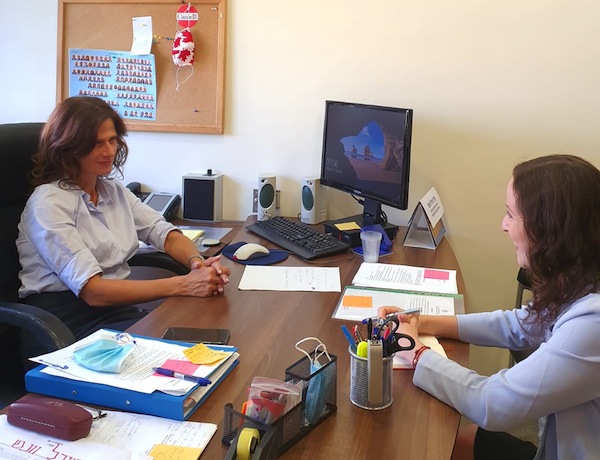Both MK Michal Cotler-Wunsh, left, and her political aide, Becca Wertman, have Canadian roots. (photo from Becca Wertman)
A new, dynamic force has hit the Knesset, with a political aide just as passionate, and both are rooted in Canada.
Michal Cotler-Wunsh, who once held Canadian citizenship, became a Member of the Knesset for the Blue and White Party this past June. She is among those who have endorsed a proposed bill that, if passed, would change the requirement that Knesset members who hold citizenship in another country must give up that citizenship.
Recently sworn in, Cotler-Wunsh heads a staff of four – a political aide, a parliamentary aide, a spokesperson and an aide who works with her on her portfolio as chair of the Drug and Alcohol Use Committee. In a recent interview, she told the Independent that the issues that concern her are “unity, mamlachliut (often translated statesmanship) and responsibility…. You can’t politicize or personalize issues,” she stressed. Two other issues about which she is passionate are “the ability to combat antisemitism and a commitment to olim [immigrants] and prospective olim.”
Cotler-Wunsh also emphasized her commitment to Israel as a Jewish and democratic state. As a lawyer and international law expert, she added that the international community and Israel must always uphold international law and not allow terror groups to exist in a culture of impunity. She specifically highlighted the importance of this in the context of Hamas not returning the four Israelis currently being held captive in Gaza, in a six-year standing violation of international law.
Jerusalem-born, Cotler-Wunsh spent her first seven years in Israel. When her mother, Ariela (née Ze’evi), married Canadian Irwin Cotler, the family moved to Montreal, where her three siblings were born. Most JI readers will be familiar with Cotler-Wunsh’s father, a former minister of justice of Canada, an international human rights lawyer, emeritus professor of law at McGill University, and founder and chair of the Raoul Wallenberg Centre for Human Rights, among other things.
Cotler-Wunsh returned to Israel for a one-year program after high school and stayed to serve in the Israel Defence Forces as a lone soldier. She then received her law degree from the Hebrew University and did her internship.
In 2000, she and her husband returned to Canada with their son but returned to Israel 10 years later, by which time they had three more children. In 2010, she became associated with the Interdisciplinary Centre in Herzliya and was a research fellow at the International Institute for Counter-Terrorism.
Cotler-Wunsh’s political aide is Vancouver-born and -raised Becca Wertman. The two met at a conference of nongovernmental organizations. “I read Becca, I heard her voice in what she writes,” said Cotler-Wunsh.
Wertman, who is the daughter of Charles and Carla Wertman of Vancouver, has a bachelor degree from the University of Southern California in international relations and a master’s from Columbia University in political science. She was managing editor and responsible for the Canada portfolio at the Jerusalem-based research institute NGO Monitor, authoring articles for a wide variety of publications.
“My messages are very nuanced; it was important to find somebody that can make my nuanced messages accessible to the public and be able to represent me,” explained Cotler-Wunsh. “Having read some of what Becca published, I saw that the values that drive me also drive Becca as well, particularly in the areas of human rights, international law, Zionism and democracy.”
Wertman manages Cotler-Wunsh’s schedule, handles all things that come in English, including media and social media, and reaches out to NGOs that fight antisemitism or are concerned with olim; she also assists Cotler-Wunsh in her foreign endeavours. Like her boss, she is passionate about issues concerning olim chadashim (new immigrants) and working with Diaspora communities.
Wertman made aliyah in 2016 and went to an ulpan to learn Hebrew; she is engaged to an oleh from Chicago. She sees her role as a perfect fit because of the values she shares with Cotler-Wunsh and their shared Canadian backgrounds. In addition, she admires Cotler-Wunsh’s father.
“As a Canadian who is interested in human rights, Prof. Irwin Cotler has been someone I looked up to for many years,” said Wertman.
In June, when Cotler-Wunsh received word that she would be a member of the Knesset, she reached out to Wertman and offered her the position.
“I’m 100% dedicated to MK Michal Cutler-Wunsh, to help her accomplish what she wants to accomplish,” said Wertman. “I fully believe in her goals. Her issues are those I care about. I feel so lucky to work for a member of the Knesset who is furthering issues that I so deeply believe in.” She added, “her background in human rights and international law, these are unique and important skills, experiences and values that can and will add to the Knesset.”
Sybil Kaplan is a journalist, lecturer, book reviewer and food writer in Jerusalem. She created and leads the weekly English-language Shuk Walks in Machane Yehuda, she has compiled and edited nine kosher cookbooks, and is the author of Witness to History: Ten Years as a Woman Journalist in Israel.


